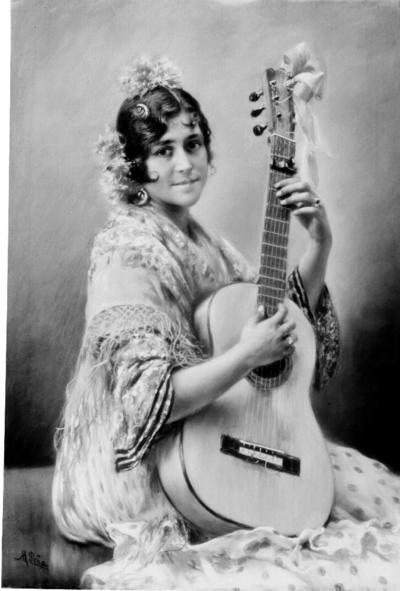Blog del Instituto Cervantes en Utrecht
Todo sobre nuestras actividades y servicios
Mujeres y el flamenco en el S.XIX

Este año, el Instituto Cervantes de Utrecht celebra el Día Internacional de la Mujer (8 de marzo) centrándose en la enriquecedora pero complicada relación entre las mujeres y la música. Para ello hemos organizado cuatro actos diferentes y los dos primeros se harán públicos el mismo 8 de marzo. En primer lugar, una mesa redonda sobre las mujeres y la música, su papel, sus legados y sus retos futuros, con la colaboración de EUNIC NL. Ese día también podremos disfrutar de un programa musical protagonizado por mujeres de toda Europa que interpretarán piezas compuestas en su mayoría por mujeres.
Además, la pianista española Lara M. Taboada ha coordinado un ciclo de conciertos llamado «Polygnota: ayer musa, hoy compositora». Desde enero hasta mayo, el Instituto ofrece un concierto mensual retransmitido en directo, que intenta rescatar la obra de mujeres compositoras como Clara Schumann o Nadia y Lili Boulanger. Todas las actuaciones estarán disponibles en nuestro canal de YouTube.
Aparte de estas actividades, hemos investigado un poco sobre cómo las mujeres españolas interpretaban y utilizaban la música popular como acto de resistencia antes de que se les permitiera acceder a los conservatorios y profesionalizar su talento. ¿Cuál era la relación entre las mujeres y el flamenco a finales del siglo XIX y antes de la Guerra Civil? ¿Y qué significó el cuplé –un género musical rompedor y descaradamente femenino– para la liberación de la mujer en España?
Si quieres saber más sobre esto – ¡y practicar tu lectura en español! – puedes hacer clic en los siguientes enlaces:
Dit jaar viert het Instituto Cervantes Internationale Vrouwendag (8 maart) door aandacht te schenken aan de verrijkende maar tegelijkertijd moeizame verhouding tussen vrouwen en de muziek. Ter gelegenheid hiervan hebben we vier verschillende activiteiten georganiseerd, waarvan de eerste twee plaats zullen vinden op 8 maart zelf.
De eerste is een rondetafelgesprek over vrouwen en muziek, hun rol, hun erfenis en hun uitdagingen voor de toekomst, in samenwerking met EUNIC NL. Op deze dag kunnen we bovendien genieten van een muzikaal programma door vrouwelijke musici vanuit heel Europa die werken uitvoeren van grotendeels vrouwelijke componisten.
Daarnaast heeft de Spaanse pianiste Lara M. Taboada een concertreeks samengesteld getiteld «Polygnota: gisteren muze, vandaag componist». Van januari tot en met mei organiseert het Instituto Cervantes maandelijks een concert via livestream, dat het werk van vrouwelijke componisten als Clara Schumann of Nadia en Lily Boulanger van de vergetelheid wil redden. Meer informatie over deze reeks vindt u hier. Alle concerten zijn beschikbaar op ons YouTube kanaal.
Naast deze activiteiten hebben we onderzoek gedaan naar de manier waarop Spaanse vrouwen de populaire muziek vertolkten en gebruikten als teken van verzet, voordat zij uiteindelijk werden toegelaten tot de conservatoria en hun talent konden professionaliseren. Welke relatie hadden vrouwen met de flamenco aan het einde van de 19e eeuw en vóór de Burgeroorlog? En wat betekende de cuplé (populair en pikant theaterlied) – een muzikaal genre dat roldoorbrekend en ongegeneerd vrouwelijk was – voor de bevrijding van de vrouw in Spanje?
Wil je hier meer over weten – én wil je oefenen met lezen in het Spaans – klik dan op de volgende links:
This year, the Instituto Cervantes is celebrating International Women’s Day (8th March) focusing on the enriching but complicated relationship between women and music. That is why we have organized four different events. The first two will take place on the 8th of March. Firstly, we will have a round table on women and music, their role, their legacies and their future challenges, with the collaboration of EUNIC NL. That day we will also be able to enjoy a musical programme performed by women from all across Europe who will perform pieces mostly composed by women.
Moreover, the Spanish pianist Lara M. Taboada has coordinated a concert series called “Polygnota: ayer musa, hoy compositora”. From January until May, the Institute offers a monthly concert in which we try to rescue the work of women composers such as Clara Schumann or Nadia and Lili Boulanger. You can find more about this here. All of the performances will be available on our Youtube channel.
On top of that, we have also done a bit of research on how Spanish women performed and used folk music as an act of resistance before they were allowed to access the conservatories and professionalize their talent. What was the relationship between women and flamenco at the end of the 19th century and before the Spanish Civil War? And what did cuplé – a ground-breaking and shameless women-oriented music genre – meant to the liberation of women across Spain?
If you want to know more about this – and practice your reading skills! – you can click on the following links: